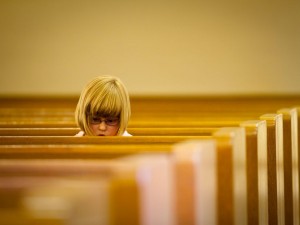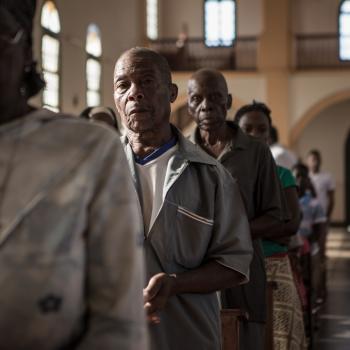 I did not enter a church until I was in third grade. My friend Vicky, who always wore long jean skirts and seemed to be liked by everybody, invited me to a Sunday school competition where she would be quizzed on Bible verses.
I did not enter a church until I was in third grade. My friend Vicky, who always wore long jean skirts and seemed to be liked by everybody, invited me to a Sunday school competition where she would be quizzed on Bible verses.
I remember dirt-colored shag carpet, wooden pews, a crowd of stern-looking women gathered around a microphone, their khaki skirts brushing their Keds. I remember Vicky standing beside them, unsure of how to phrase the lines of Psalm 23—was it a rod? A staff?
And I remember running up to the microphone myself, eager to talk, completely clueless about the Psalm. “It’s rod! It’s rod!” I said, unaware that my jeans and my loud voice were twisting the women’s frowns into tighter knots.
“That is incorrect,” one said. “Please sit down.”
My parents both grew up in homes where church was required. My mother was confirmed in an Episcopalian parish that ignored the black eyes my grandmother showed up with every Sunday morning. My father was Catholic, but stopped attending Mass sometime after high school, when his wandering heart was no longer under my grandfather’s stern watch.
“We want you to make your own choices,” my father told us when we asked about church and why we didn’t attend. We spent Sunday mornings either sleeping in or eating brunch; later, as my parents’ marriage became more fragile, we spent whole weekends in front of the television, trying not to disturb the angry silence.
It’s seemed that, since I was little, the longing for church has been something I’ve followed. Before those Sunday morning brunches, I would get dressed up and pray in my room, which simply meant that I chatted with Jesus about My Little Ponies and cartoons.
But as I got older, the longing was something that followed me, something that became more serious. It showed up in the Mass I attended with some neighbor girls, who simultaneously bickered and crossed themselves, and in the mega-church revival I attended with a guy from my driver’s education class. Their youth group leader, a tiny lady with frosted hair, sucked her teeth when I didn’t want to pray a “prayer of salvation” with her.
Longing followed me into the Presbyterian church I explored one afternoon, my purse stuffed with brochures about the Trinity, and to Holy Name Cathedral in Chicago, where I wept uncontrollably in a dark sanctuary without knowing why.
I usually went to church on my own, sometimes trying to bring my mother or sister. My mom would sit through the service and then bolt to the car. “It’s too much,” she would say, her hands trembling. “All I can do is cry.”
In the ten years since my conversion, I have gotten used to letting my mind wander between the elements of the service, the offering of prayers. The longing has settled somewhat, and even when I am moved, I am inwardly mute, the tasks of the week ahead taking up my focus in the midst of icon and choir, sacrament and song.
But longing has not settled for my mother. She attends church more frequently now, trying to make it to services at the little nondenominational church down the street from her house. She stays for the sermon, then bikes to the grocery store where she works, listening to her customers’ stories, making notes about whom to pray for. She still cries.
“I have no excuse not to go,” she says, “and it’s good for me to be there, even if it scares me.”
I have tried for a long time to make sense of how my mother’s choices have affected my life. I have tried to do so with fear and trembling, which says little about me and more about my mother, who has spent my whole life seeking God, unsure of what she has to offer, unconvinced that she is loved.
I’ve been thinking a lot about inheritance lately, as I look onward to July, when my first child is due. In the choices my husband and I make about names and living places, about our work and about our finances, I am always thinking about what we’re passing onto our child.
And in many ways, what I fear passing on is spiritual in nature—what longings, and what habits, will my child inherit from me? What might haunt my baby, and what can I do to be more help than harm?
I don’t think that my longing for church, and my eventual place in it, came directly from my mother. But I do believe that her own longing for wholeness, and for healing, was a conduit for my own spiritual seeking, and in the churches I have passed through, I have experienced fuller senses of the love that has been seeking me my whole life. The love that seeks my mother still, and that seeks my child, who is stirring more frequently these days, especially during church.
And where does that stirring come from? Both within and without, something that follows me and that I will also follow, my heart and mind both joyful and terrified, the same love still moving through me, my mother, my child—moving through all of us and out into a world filled with longing.










